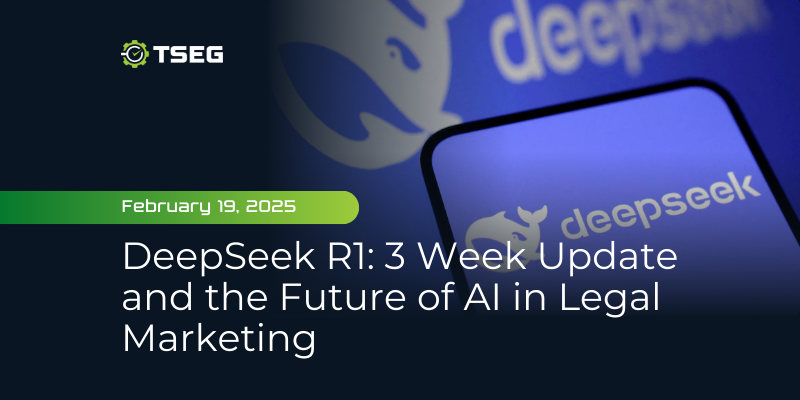DeepSeek R1: 3 Week Update and the Future of AI in Legal Marketing
Posted on Wednesday, February 19th, 2025 at 2:03 pm
A Fast Start, but Has the Growth Continued?
The newest player in the generative AI race, DeepSeek, is a Chinese startup that recently introduced its open-source model, DeepSeek-R1. Unlike proprietary models from OpenAI and Google, DeepSeek-R1 is freely available, allowing businesses and developers to access high-level AI without the constraints of a closed system – all while requiring far less computational power. The model quickly gained attention for delivering high-quality generative AI with lower operational costs, making it an attractive option for businesses and researchers looking to integrate AI without heavy infrastructure investments.
Early adoption was strong, particularly in China’s financial sector, where firms began exploring its use for automation and data analysis. The model’s open-source availability also sparked interest among developers seeking a flexible alternative to closed AI systems. Given these factors, some expected DeepSeek-R1 to challenge both OpenAI and Google’s dominance in the AI space.
However, months after release, its long-term impact remains uncertain. While DeepSeek-R1 initially drew interest from several companies, its expansion outside of China appears limited. Unlike ChatGPT, which has seen widespread adoption across multiple industries, DeepSeek-R1 has struggled to gain significant traction in Western markets.
Several factors may be slowing its momentum. One challenge is infrastructure—DeepSeek lacks the extensive cloud partnerships and API integrations that have fueled OpenAI’s and Google’s reach. Another major issue is trust and compliance. Some businesses outside of China remain hesitant about adopting AI models that may not meet Western data security and regulatory standards.
Whether DeepSeek-R1 can continue growing depends on how well it addresses these challenges. If it remains primarily a China-focused model, its broader influence on AI-driven search and global competition may be weaker than initially expected.

Security, Censorship, and the Challenges of Open AI
DeepSeek-R1’s open-source nature was initially seen as a major advantage, giving businesses and developers unrestricted access to a high-performing AI model. However, as adoption has progressed, concerns around security, misinformation, and content restrictions have started to surface, potentially limiting its growth.
One of the biggest challenges is data security. Open-source models can be modified and deployed by anyone, which makes them harder to regulate. Without a centralized governing body ensuring responsible usage, companies using DeepSeek-R1 must take extra precautions to protect sensitive data. According to Inside Government Contracts, Meanwhile, the U.S. Navy issued a memo on January 24 to service members prohibiting the use of DeepSeek’s AI models “in any capacity” because of “potential security and ethical concerns associated with the model’s origin and usage.” For industries like law and finance, where confidentiality is essential, the lack of built-in safeguards could make firms hesitant to integrate the model into their operations.
Censorship concerns have also raised questions about DeepSeek-R1’s viability outside of China. Some researchers have speculated that the model may be subject to content filtering in compliance with China’s strict information regulations. If DeepSeek-R1 is limited in the types of information it can generate or access, businesses outside of China may be less willing to adopt it—especially those that rely on AI for research, marketing, and client communications.
These issues highlight the ongoing debate over whether open-source AI is truly the future or if it introduces more risks than benefits. While DeepSeek-R1 initially gained momentum as a more accessible alternative to proprietary AI, concerns over security and censorship may be slowing its global expansion.

DeepSeek’s Market Impact
When DeepSeek-R1 was introduced, some saw it as a potential disruptor to both OpenAI and Google, particularly in the AI-driven search space, as we spoke about in our previous blog post. Its open-source model and lower computational demands made it an appealing alternative to proprietary AI systems, leading to speculation that it could challenge the dominance of ChatGPT and influence how users interact with search engines.
In fact, DeepSeek’s launch last month led NVIDIA, the world leader in AI computing, to suffer a 17% stock drop totaling $600 billion, the biggest one-day loss by a U.S. company, ever. This plummet created buzz around DeepSeek’s entrance in the market, but NVIDIA’s stock price has almost recovered less than a month later.
At this time there is no clear evidence that DeepSeek-R1 has significantly altered the balance of power in AI search. While it has gained traction within China, its expansion into global markets has been slower than expected. OpenAI’s ChatGPT remains widely used, and Google continues to integrate AI into its search engine, reinforcing its market position.
Although DeepSeek-R1 showed early promise, its impact remains uncertain. If it does not expand beyond its current reach, it may end up as a regional competitor rather than a global challenge to OpenAI or Google.
What This Means for Law Firms and AI-Driven Marketing
DeepSeek-R1’s early momentum suggested that it could be a major player in AI-driven search, but its slow international expansion and regulatory concerns raise questions about its long-term influence. For law firms, this means that while AI is still reshaping digital marketing, the urgency to optimize specifically for DeepSeek-powered search may not be as immediate as some initially thought.
However, firms should not ignore the broader trend of AI-driven search and content generation. Even if DeepSeek-R1 has not made a significant impact outside of China, other AI models continue to shape how potential clients find legal services. OpenAI, Google, and emerging competitors are investing heavily in AI-powered search, which means that law firms need to adapt their marketing strategies.
This is where TSEG provides an advantage. As AI-driven search engines continue to develop, law firms must have a strategy that goes beyond traditional SEO. TSEG helps firms stay ahead by creating content optimized for both traditional and AI-powered search, ensuring that potential clients can find them no matter how search technology improves.
While DeepSeek-R1’s global impact remains uncertain, AI in legal marketing is here to stay. Law firms that embrace AI-driven content strategies now will be better positioned to attract and engage clients in the years ahead. Contact us today.
